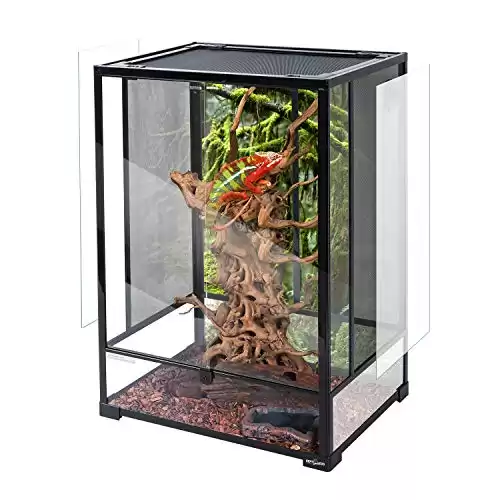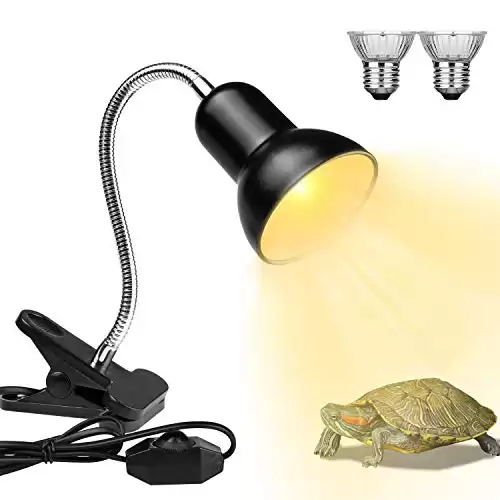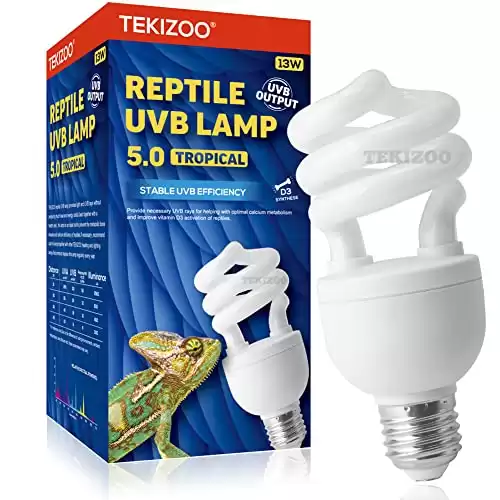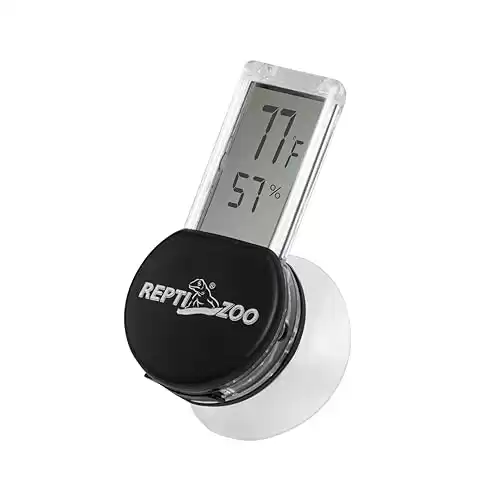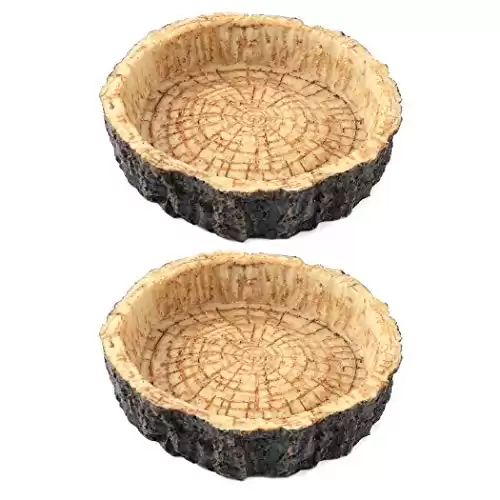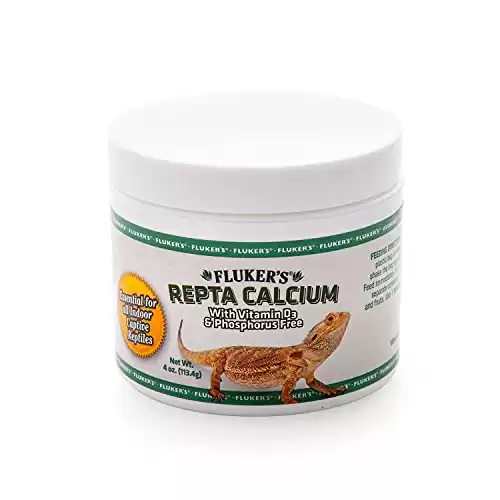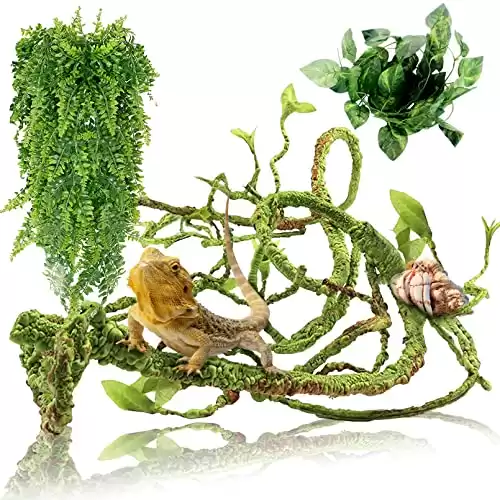Veiled chameleons (Chamaeleo calyptratus) are one of the most popular pet chameleon species. They are known for their beautiful appearance, their ability to change color, and their relatively easy care requirements. But are veiled chameleons good for beginners?
Veiled chameleons are arboreal lizards native to Yemen and Saudi Arabia. They are one of the largest chameleon species, with males growing up to 24 inches long and females growing up to 18 inches long. Veiled chameleons are known for their vibrant green color and their helmet-like casque on their head.
Veiled chameleons can be rewarding pets, but they’re not the right choice for everyone. If you’re considering getting a veiled chameleon, be sure to do your research and make sure you’re prepared to provide the proper care.
Are Veiled Chameleons Good for Beginners?
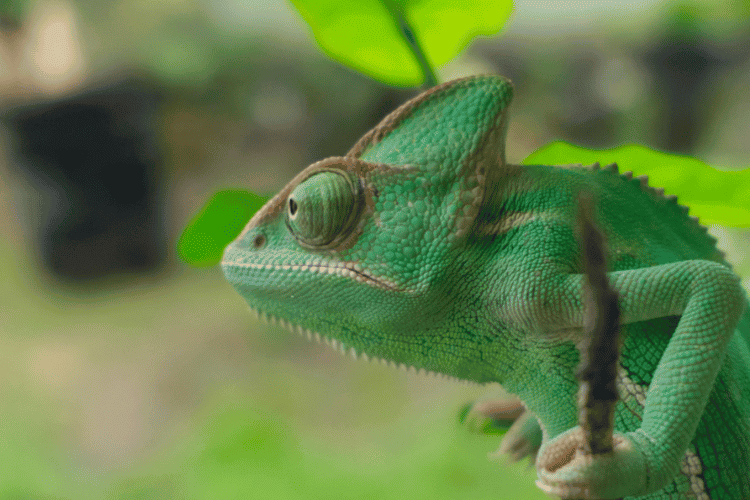
Veiled chameleons are like the supermodels of the reptile world. They’re beautiful, they’re exotic, and they know it. But are they good for beginners?
That’s a tough question to answer. On the one hand, veiled chameleons are relatively easy to care for. They don’t need a lot of special food, and they’re pretty hardy. On the other hand, veiled chameleons can be quite demanding. They need a large enclosure with plenty of climbing space, and they can be susceptible to health and stress problems.
So, what’s the verdict? Are veiled chameleons good for beginners? Well, it depends. If you’re willing to do your research and provide your chameleon with the proper care, then a veiled chameleon could be a good pet for you. But if you’re looking for a low-maintenance pet, then a veiled chameleon is not the right choice for you.
If you’re a beginner chameleon owner, it’s important to do your research and make sure you’re prepared to provide your chameleon with the proper care. Veiled chameleons can be rewarding pets, but they’re not for everyone.
The Pros of Having a Veiled Chameleon
Veiled chameleons are relatively easy to care for, and they’re a good way to learn about the basics of chameleon ownership.
There are a few pros to a beginner having veiled chameleons:
- They are relatively easy to care for. Veiled chameleons don’t need a lot of special food, and they’re pretty hardy. If you are brand new to keeping chameleons, a veiled chameleon is probably one of the better ones to choose.
- They are widely available. Veiled chameleons are one of the most popular pet chameleon species, so they are widely available in pet stores and online.
- They are relatively affordable. Veiled chameleons are not as expensive as some other pet chameleon species. Adult chameleons can easily be found at pet shops.
- They can teach you responsibility. Taking care of a veiled chameleon is a big responsibility, but it’s also a very rewarding experience. Learning how to properly care for a chameleon will teach you valuable life skills, such as responsibility, patience, and attention to detail.
- They can be your best friends. Chameleons may not be known for their affectionate nature, but they can still form strong bonds with their owners. If you spend enough time with your chameleon, it may even start to recognize you and come to you for food and attention.
- They’re a conversation starter. When you have a veiled chameleon as a pet, you’re guaranteed to get a lot of attention. People are always fascinated by these unique creatures, and you’ll be able to teach others about the amazing world of chameleons.
The Cons of Having a Veiled Chameleon
Veiled chameleons are one of the most popular pet chameleon species, but they’re not without their drawbacks. Here are a few of the cons of having a veiled chameleon.
- They’re solitary animals. This means that you can’t house two veiled chameleons together, or they’ll fight. So if you’re looking for a pet that you can cuddle with, a veiled chameleon is not the right choice for you.
- They require a lot of space. Veiled chameleons need a large enclosure with plenty of climbing space. So if you’re living in a small apartment, a veiled chameleon is not the right pet for you. Veiled chameleons are typically up to 18-24 inches long and have a lifespan of 5-7 years in captivity. So you will need a big enclosure or they will outgrow it quickly.
- They can be picky eaters. Veiled chameleons can be difficult to feed, and they may refuse to eat certain foods. So if you’re not patient, a veiled chameleon is not the right pet for you.
- They’re susceptible to health problems. Veiled chameleons are prone to a number of health problems, including dehydration, respiratory infections, and eye infections. So if you’re not prepared to deal with vet bills, a veiled chameleon is not the right pet for you.
What to Consider Before Getting a Veiled Chameleon
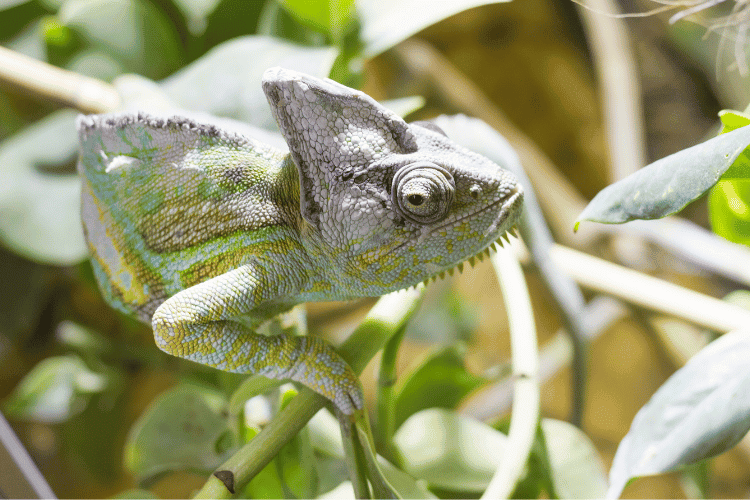
Before getting a veiled chameleon, there are a few things you should consider:
- Your experience level: Veiled chameleons are relatively easy to care for, but they do require some specialized knowledge. If you’re a complete beginner, it’s a good idea to do some research on chameleon care before you get one.
- Your budget: Veiled chameleons themselves are relatively affordable, but you’ll also need to purchase an enclosure, food, and other supplies. Chameleon care can be expensive, so make sure you’re prepared to budget accordingly.
- Your lifestyle: Veiled chameleons require regular care and attention. If you travel frequently or have a busy schedule, a veiled chameleon may not be the right pet for you.
- Your commitment to providing proper care: Veiled chameleons can live for up to 7 years in captivity, so it’s important to be prepared to commit to providing them with the proper care for their entire lifespan.
- Space requirements: Veiled chameleons require a large enclosure with plenty of climbing space. The absolute minimum recommended enclosure size is 18 inches wide x 18 inches deep x 36 inches tall, but bigger is better as they grow up to 24 inches. If you get a small enclosure, you may need to buy another one really soon!
- Diet: Veiled chameleons are omnivores and eat a variety of insects, fruits, and vegetables. You’ll need to be able to provide your chameleon with a fresh and varied diet on a daily basis.
- Health concerns: Veiled chameleons are susceptible to a number of health problems, including dehydration, respiratory infections, and eye infections. It’s important to be aware of these potential health problems and to be prepared to take your chameleon to the vet if necessary.
If you’ve considered all of the above factors and you’re still interested in getting a veiled chameleon, then go for it!
Conclusion
Veiled chameleons can be rewarding pets for beginners, but it is important to be prepared to provide them with the proper care. This includes providing them with a large enclosure with plenty of climbing space, a varied diet, and regular veterinary care.
Veiled chameleons are solitary animals and should be housed individually. They require a diet of insects, fruits, and vegetables.
If you are considering getting a veiled chameleon, be sure to do your research and make sure you are prepared to provide them with the proper care.

